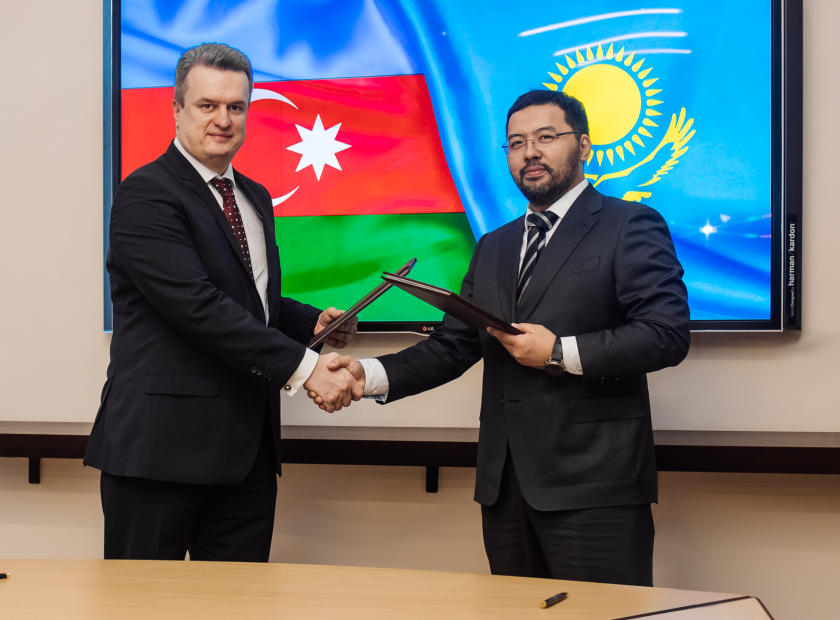The backbone telecommunication operators of Azerbaijan and Kazakhstan, AzerTelecom and Kazakhtelecom, have recently entered into a new agreement to collaborate on the Trans-Caspian project.
The agreement specifies the primary conditions for collaboration as per the previous memorandum, including the implementation of tangible measures to install a fiber-optic communication line (FOCL) between Azerbaijan and Kazakhstan along the bottom of the Caspian Sea.
“The implementation of this project is very important for both Kazakhstan and Azerbaijan. For Kazakhstan and Asian countries, this is a new alternative route, as well as an improvement of the network connectivity and reliability, while for Azerbaijan it means a transformation into a regional digital hub,” Capacity Media quoted Sergey Nazarenko, Chief Operations Officer at AzerTelecom, as saying.
“The historic Silk Way is being digitally reborn, and this route will allow transmission of hundreds of terabytes of information. This will accelerate the development of data storage and processing infrastructure along the entire route. The transmission of data flows from Asia to Europe through Azerbaijan and Kazakhstan will create new opportunities for the development of digital business in the region.”
A top-notch design and a detailed roadmap for the project have already been developed. After the feasibility study the construction of fiber-optic data cables along the Caspian Sea’s bed will be implemented. The estimated timeline for the completion of the Trans-Caspian project is expected to be by the end of 2024.
“The FOCL laying project is very important for Kazakhstan. With its implementation, we will get an additional access to international traffic and a new channel, which will ensure the transit of the global traffic flow from Asian countries through Kazakhstan and via a submarine cable to Azerbaijan with further access to Europe through Georgia, the Black Sea, and Bulgaria,” said Almat Karamanov, Chief Commercial Officer — B2B at Kazakhtelecom.
“In addition, within this project, we will be able to simultaneously create other large infrastructure projects, such as a superhighway or, for example, the construction of new Data Centers. As a result of the development of such projects, Kazakhstan will become interesting and promising for major international players,” he added.
AzerTelecom and Kazakhtelecom have been partnering to implement the construction of the Trans-Caspian Fiber-Optic data transmission cable line along the bottom of the Caspian Sea, which is one of the key segments of the “Digital Silk Way” project.
A strategic partnership memorandum for the project of laying the subsea cable line was signed by the companies in September 2022. According to Kazakhstan’s Minister of Digital Development, Innovation, and Aerospace Industry, Bagdat Musin, the construction will start in 2023. The subsea line, which measures 340 kilometers in length, will stretch from the Kazakh port city of Aktau to the city of Siyazan in Azerbaijan, while the reserve cable, with a length of about 330 kilometers, will be laid from the Kuryk port in Kazakhstan to Buzovna, a seaside settlement on the outskirt of Azerbaijan’s capital Baku.
The “Digital Silk Way” mega project, launched by NEQSOL Holding and implemented by its subsidiary AzerTelecom, is aimed to create a modern transit fiber-optic infrastructure network connecting Europe to Central and South Asian markets.
Once complete, it will reportedly serve as the most advanced route for digital connectivity between two continents, making a significant impact towards enhancing digitalization and connectivity in the region, including Caucasus, Central, and South Asia. At the same time, the “Digital Silk Way” project also provides the possibility of turning the region into a potential destination for global hyperscalers like Google, Amazon, Netflix, and others.
The project was selected as one of the five best strategic infrastructure projects in Asia at the Global Strategic Infrastructure Leadership Forum in the United States.







 The number of evacuees from flooded areas in Kazakhstan has reached 97,852 people, including about 32,856 children since March 27.
The number of evacuees from flooded areas in Kazakhstan has reached 97,852 people, including about 32,856 children since March 27.
 The Islamic holy month of fasting, Ramadan comes to an end this week with the celebration of a joyous festival called Eid (meaning “festival” in Ar...
The Islamic holy month of fasting, Ramadan comes to an end this week with the celebration of a joyous festival called Eid (meaning “festival” in Ar...
 Iran's senior military leaders described the drone and missile attack on Israel on April 14 night as “successful".
Iran's senior military leaders described the drone and missile attack on Israel on April 14 night as “successful".
 Iranian President Ebrahim Raisi warned Israel that it would face a "real and extensive" response if it makes any "mistake" following Tehran’s missi...
Iranian President Ebrahim Raisi warned Israel that it would face a "real and extensive" response if it makes any "mistake" following Tehran’s missi...



